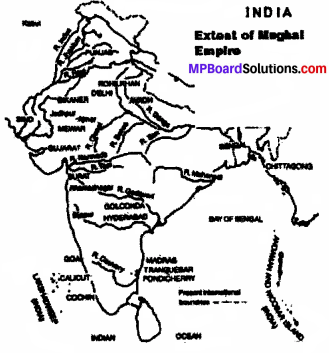MP Board Class 7th Social Science Solutions Chapter 22 Aurangzeb and the Decline of the Mughal Empire
MP Board Class 7th Social Science Chapter 22 Text Book Questions
Choose the correct alternatives:
Class 7 Social Science Chapter 22 MP Board Question 1.
Aurangzeb ruled for:
(a) 30 years
(b) 40 years
(c) 50 years
(d) 60 years
Answer:
(b) 40 years
Mp Board Class 7th Social Science Chapter 22 Question 2.
The Jats lived near:
(a) Delhi and Agra
(b) Agra and Mathura
(c) Mathura and Bharatpur
(d) Arga and Jhansi
Answer:
(b) Agra and Mathura
The Jets Lived Near MP Board Question 3.
The third battle of Panipat was fought in:
(a) 1526 AD
(b) 1556 AD
(c) 1560 AD
(d) 1761 AD
Answer:
(d) 1761 AD
Decline Of Mughal Empire Class 7 MP Board Question 4.
The Indian goods which were in great demand in the European markets were:
(a) Clothes and spices
(b) Clothes and silver
(c) Spices and gems
(d) Spices and horses
Answer:
(a) Clothes and spices
Fill in the blanks:
- ……………. and …………. were die Bundela rulers who revolted against Aurangzeb.
- Gurudwara Sheshganj was built at the Martyrdom place of ……………
- Nadh Shah invaded India in ………….
- Due to Aurangzeb’s policy of …………….. the Mughal administration weakend.
Answer:
- Compestral, Chhatrasal
- Guru Teg Bahadur
- 1739 AD
- Deccan
MP Board Class 7th Social Science Chapter 22 Short Answer Type Questions
Mp Board Class 8 Social Science Solution Chapter 22 Question 1.
Which taxes were imposed on the Hindus by Aurangzeb?
Answer:
Aurangzeb imposed the Jazia tax on the Hindus.
Mp Board Class 8 Social Science Chapter 22 Question 2.
Who do you know about the Satnamis?
Answer:
Satnamis were the followers of truth. They used to dress like the purohits orpriests. They revolted due to the religious oppression of Aurangzeb. Their main center was Namaul and Mewar. However Aurangzeb suppressed their revolts ruthlessly.
Mp Board Class 8 Social Science Solutions Chapter 22 Question 3.
Due to which policy of Aurangzeb his successors remained weak?
Answer:
Due to Aurangzeb’s policy of expansion his successors remained weak. The Mughal Empire was very vast and it was difficult to manage such a vast empire. The incompetent successors were not able to protect it.
Social Science Success Class 7 Solutions MP Board Question 4.
What were the outcomes of the invasions of Nadir shah and Ahmad Shah Abdali?
Answer:
As a result of the invasions of Nadir Shah and Ahmad Shah Abdali the Mughal Empire became weak and remained restricted to Delhi and surrounding area.
MP Board Class 7th Social Science Chapter 22 Long Answer Type Questions
Class 8 Social Science Chapter 22 MP Board Question 1.
Describe the causes of the decline of the Mughal Empire.
Answer:
After the death of Aurangzeb in 1707, the Mughal Empire broke up. Its fall had already begun during Aurangzeb’s reign. But during the eighteenth century the fall was nearly complete.
The factors that led to the down-break of the Mughal empire were as follows:
1. Weak and incapable successors:
The successors of Aurangzeb were very weak and incapable. They had no capacity to rule over such a vast empire. They remained puppets in the hands of their subedars and other officers.
2. Wars of succession:
After the death of Aurangzeb war of succession broke out. They reduced the strength of the Kingdom.
3. The Suspicious nature of Aurangzeb and his rigid religious policy:
Aurabgzeb’s nature was very suspicious. Due this nature he could not provide administrative and military training to his sons. As a result they became incapable of managing the empire. His religious policy was based on intolerance. This made the Sikhs, Jats, Satnamis, Rajputs and Marathas his great enemies. They revolted against him.
4. Aurangzeb’s Deccan Policy:
Aurangzeb spent the last 25 years of his life fighting battles in the south. This made the Mughal administration in the north very weak.
5. Luxurious life styles of the Mughal rulers and Aristocrats:
Resulted in the decline of the Mughal Empire.
6. Foreign invasion:
Nadirshah, the ruler of Iran invaded the Mughal Empire in 1739. He looted the wealth about seventy crores of rupees. After his assassination in 1747 AD his general Ahmadshah Abdali, became the ruler and fought third battle of Panipat with Maratha in which Maratha were defeated. Because of these invasions Mughal Empire became weak and remained restricted to Delhi and surrounding areas.
7. Lack of Naval Power:
Neglect of navy proved fatal for the Mughal Empire.
Project Work:
On an outline map of India mark the extent of the Mughal Empire. Also mark the areas of Bundelas, Jats and Satnamis.
Answer:
